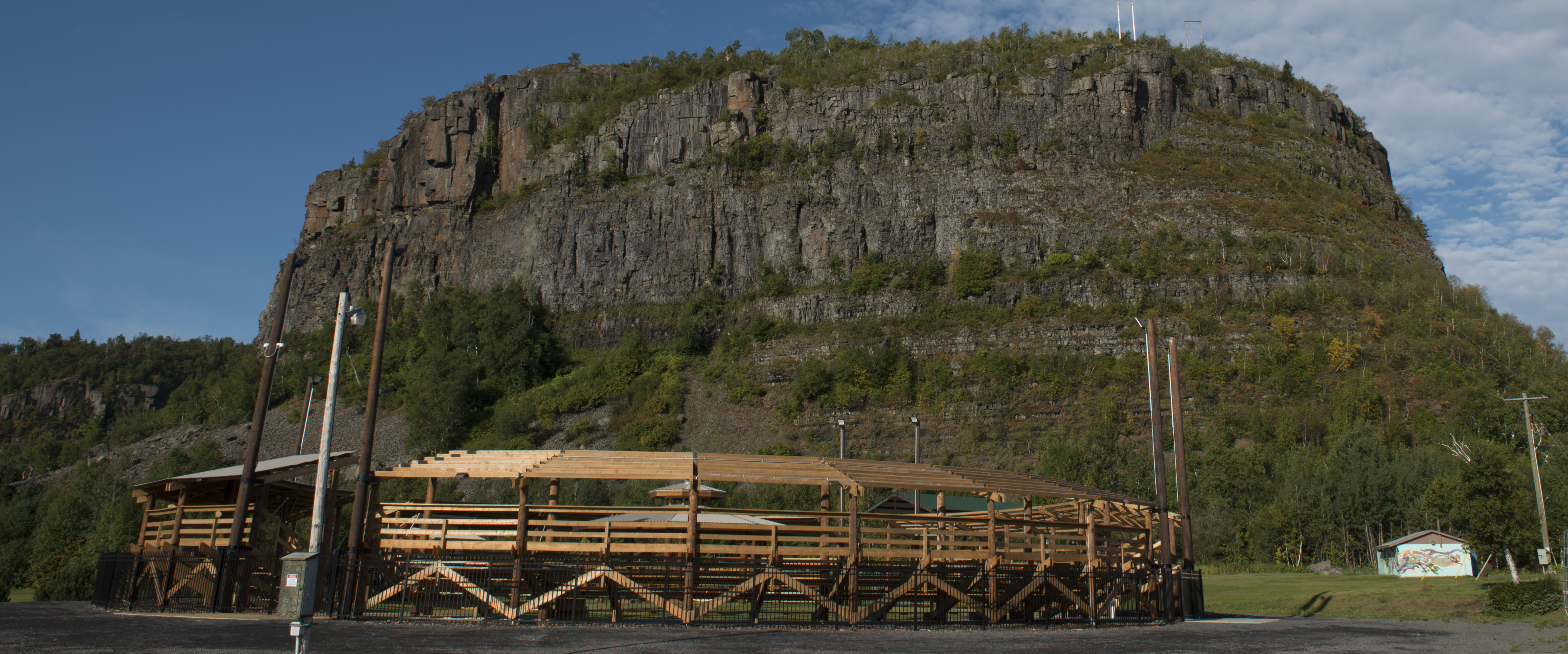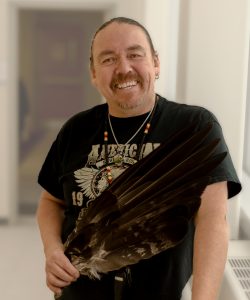Elders and Knowledge Carriers
 Mount McKay, Fort William First Nation
Mount McKay, Fort William First Nation
NOSM University Elders are Indigenous persons who have certain gifts for working with community members. Each of these gifts, separately or together, is related to maintaining the holistic health of a community, and each of these gifts could be utilized in a ‘healing’ effort by Elders. At the same time, all Elders share qualities or characteristics which are recognized by the community as qualities or characteristics which the community may reference when bestowing Elder status on an individual.
Who is an Elder?
Elder Support
For NOSM University Indigenous students, the presence and work of Elders can be a key factor which contributes to student success. Elders help students balance the two worlds which they may see themselves living within – that of home and that of the School. Elders may assist Indigenous students in understanding their ancestry and maintaining a positive identity and self-image by gaining greater knowledge and appreciation of their roots.
For all students, Elders can provide a safe and willing sounding board, as well as a caring, objective, accepting and non-judgmental confidante during difficult times, whether those difficulties are academic, social or otherwise. Elders provide advice and guidance in such a way that the recipient is sufficiently empowered and confident to make their own conclusions and subsequent decisions about an issue, thereby taking ownership and increasing probability of success.
For staff and faculty, Elders provide an open-minded and accepting approach in their observation, reflection and advice. Informal and formal teachings are provided to raise awareness of Indigenous history and worldview and to help both Indigenous and non-Indigenous staff and faculty increase their own cultural competency.
Elders are essential consultants around new developments at the University, whether it is a student recruitment effort or a research project to be conducted in an Indigenous community. Involving Elders early on in project conception and design is one of the best ways the University can ensure Indigenous concerns and sensitivities are incorporated in University activities at the outset.
Cultural Support
Traditional Teachings
- The Creation Story, Turtle Island, and how all people are to live together in Creation;
- A traditional Indigenous worldview and other perspectives;
- A clan system and its function in traditional and contemporary society;
- Indigenous languages, their effect on culture, and what the language says about cultural and social norms;
- Sewing and leatherwork;
- Food harvesting, preservation, and preparation;
- Teachings about, and staying connected to, land-based activities;
- Seasonal cycles and the changing of the seasons;
- Storytelling;
- Humility and humour and their role in health and healing;
- Holistic health; and,
- Traditional knowledge, healing medicines, and ceremony.
Historic Indigenous Elder Gathering
Since 2005, the School had developed relationships with more than 20 Elders who each have special gifts for working with community members. NOSM University’s Council of Elders was comprised of these Indigenous peoples who possess gifts and significant knowledge of traditional, cultural, and spiritual customs and practices. Each of these gifts, separately or together, is related to maintaining the holistic health of a community. Their knowledge is gained through a full life of learning, experiences, and teachings received from other Elders and traditional people.
NOSM University recognized the need to restructure the Council of Elders, reduce the number of Elders formally engaged with the School, and develop a more formal process for determining which Elders would work with NOSM University learners, staff, and faculty. Rather than forming a corporate style working group, the School decided it was best to bring the question on how to restructure the Council of Elders to the Elders themselves and chose the traditional way of bringing how to change the Council of Elders to the spirits for guidance through ceremony.
The three-day gathering began with a traditional feast and a sacred Turtle Lodge Ceremony atop scenic Mt. McKay. The following two days brought the Elders together for facilitated discussions about the purpose, function, and responsibility of NOSM University Elders and those on the Elder’s Council. Through sharing and discussion, it was decided that the Elder’s Council shall be guided in their work by the Seven Grandfather teachings:
- Nibwaakaawin (Wisdom)
- Zaagi’idiwin (Love)
- Minaadendamowin (Respect)
- Aakode’ewin (Bravery)
- Gwayakwaadiziwin (Honesty)
- Dabaadendiziwin (Humility)
- Debwewin (Truth)
Since the gathering in 2015, the Council of Elders has been be comprised of eight Elders, with four female and four male representatives. Each Elder represents one of the cardinal directions of the medicine wheel to ensure the spiritual, cultural, political, and territory of each region is represented.
NOSM University Elders provide support to NOSM’s Indigenous learners; provide cultural teachings to students, staff, and faculty; offer traditional ceremonies and blessings; ensure Indigenous medical students are recruited to the School; review applications for Indigenous applicants to the School; participate in quarterly meetings of the School’s Indigenous Reference Group meetings; assist with developing and approve Indigenous content in NOSM University’s curriculum; and, work with the School to ensure connections are maintained with First Nations and Métis communities across the North.
Knowledge Carrier enlightens NOSM University students
Source: Northern Ontario Medical Journal
 Perry McLeod-Shabogesic, from Nipissing First Nation, is a Knowledge Carrier who has been working with the NOSM University community for 10 years. McLeod-Shabogesic, Director of Traditional Programming at Shkagamik-Kwe Health Centre, has been involved in a wide range of activities with the School, including orientation week for new medical students and the annual CampMed for high school students interested in a career in health care. He also shares stories with NOSM University medical students, faculty, and staff at Elder-on-Campus sessions.
Perry McLeod-Shabogesic, from Nipissing First Nation, is a Knowledge Carrier who has been working with the NOSM University community for 10 years. McLeod-Shabogesic, Director of Traditional Programming at Shkagamik-Kwe Health Centre, has been involved in a wide range of activities with the School, including orientation week for new medical students and the annual CampMed for high school students interested in a career in health care. He also shares stories with NOSM University medical students, faculty, and staff at Elder-on-Campus sessions.
Though McLeod-Shabogesic is humble and not one to call himself an Elder, he has a great deal of knowledge to share with those willing to learn more about the Indigenous culture. “If people see me as an Elder, they will say that,” says McLeod-Shabogesic. “As life goes on, more and more people see you in the same way and that’s when you’ll make your way to full acknowledgement of being an Elder. But the Elders I know are uncomfortable with calling themselves an Elder because there is a certain level of humility that you need to carry.”
It’s important to McLeod-Shabogesic that he shares his worldview, based on his life experiences, with those who are willing to learn more about Indigenous culture. Often called Anzoked, meaning storyteller, McLeod-Shabogesic says it’s important to him to bring a different understanding or worldview to NOSM University students who may one day be learning or practising in a First Nation community.
“I’d like to give them a little bit of understanding to start from when they come to our communities. My name means storyteller, so part of my role is to share stories and understanding,” says McLeod-Shabogesic. “Being able to be a part of the journey of the School, even in a small way, is an honour for me,” he said.


